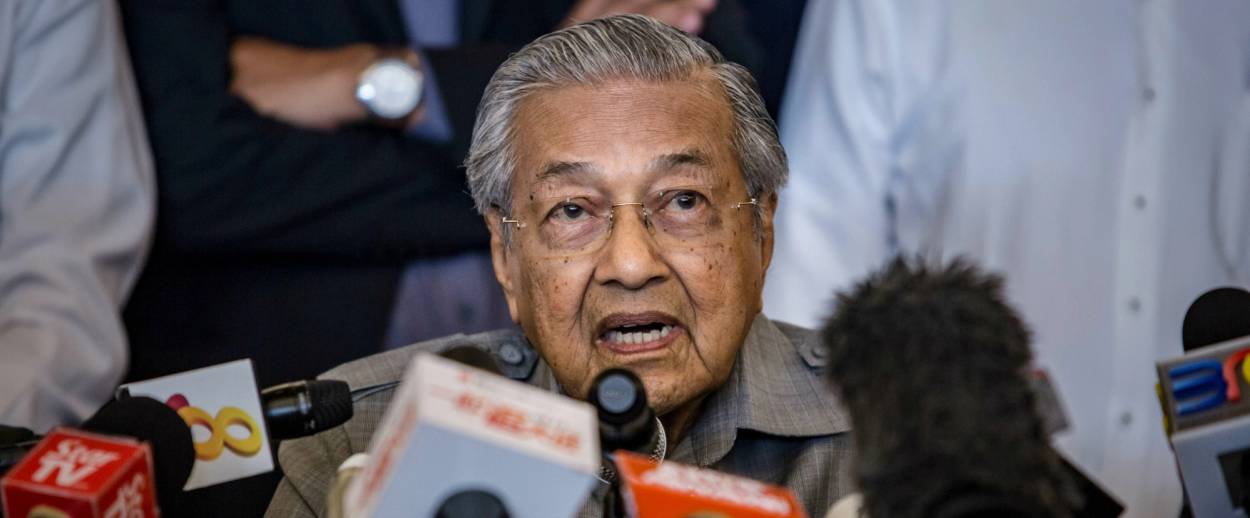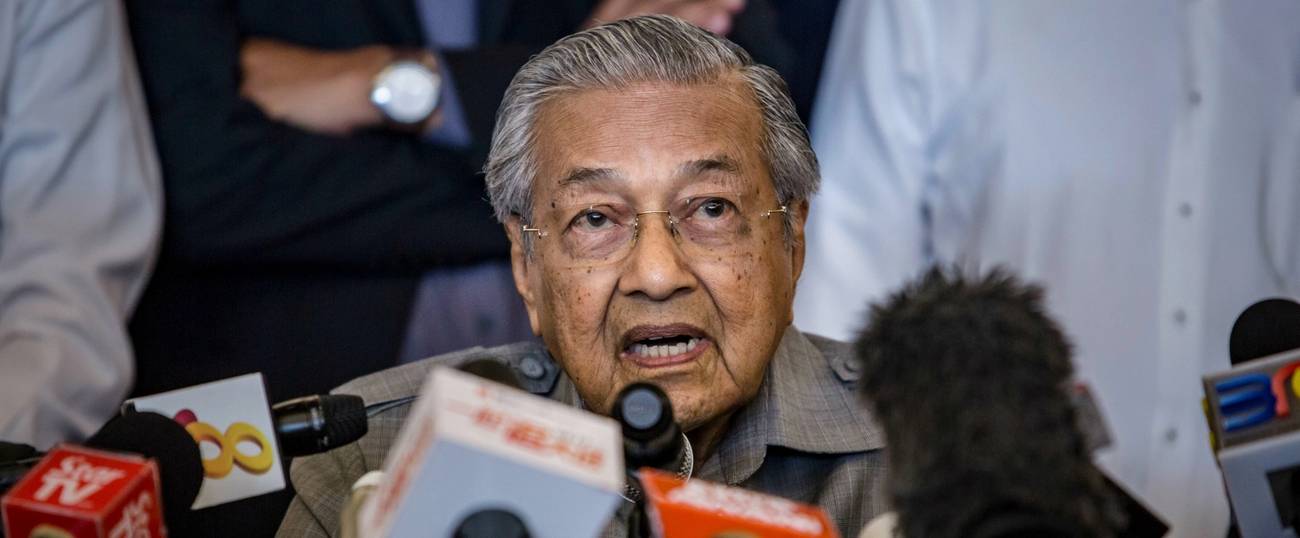Malaysia’s Newly Elected Prime Minister Has a Troubling History of Hating Jews
‘I am glad to be labeled anti-Semitic,’ Mahathir Mohamad wrote in 2012




Malaysia’s longest-reigning prime minister Mahathir Mohamad was already in possession of an impressive legacy: An iconic statesman at home and a self-appointed bulwark against the bullying West, he transformed his country into a regional economic powerhouse. Yet after a shock election victory on May 9, Mahathir, now nearly 93-years-old, is back at the top, leading a coalition of his former foes and spearheading Malaysia’s first democratic transfer of power since independence in 1957.
For many, Mahathir’s newfound commitment to reform represents a much-needed windfall in a region where democracy was on the back foot. Few commentators seem willing to sully the moment by confronting one of the more repugnant aspects of Mahathir’s record: anti-Semitism.
“I am glad to be labeled anti-Semitic,” Mahathir wrote in 2012 on his personal blog. “How can I be otherwise when the Jews who so often talk of the horrors they suffered during the Holocaust show the same Nazi cruelty and hard-heartedness.”
This sort of shorthand vilification of the Jews pervaded Mahathir’s first reign, which lasted from 1981 to 2003 and saw sweeping repression of civil liberties. To the consternation of Western allies, he baked anti-Semitism and anti-Zionism into the bedrock of conservative politics in Malaysia.
Modern Malaysian anti-Semitism “traces back to Mahathir,” said Rabbi Abraham Cooper, associate dean at the Simon Wiesenthal Center, calling the autocrat-turned-reformer “the only true blown anti-Semite power player” in Southeast Asia. “Part of his definition of being a Malaysian, and his political/religious identity, was anti-Semitism,” Cooper said.
Much of Malaysians’ antipathy towards Israel can be attributed to their government’s longstanding support for the Palestinian cause. But Mahathir’s rancor extends far beyond geopolitics, spanning classical anti-Semitic tropes, from alleging international Jewish conspiracies to blaming the 1997 Asian financial crisis on George Soros.
“The Jews rule this world by proxy,” he told the Organization of Islamic Cooperation summit in in 2003, focusing mostly on the threat posed by one group not in attendance.
In the 2012 blog post, which discussed the death of an American pro-Palestinian activist in Gaza, Mahathir concluded that sympathy for victims of the Holocaust is “wasted and misplaced.”
Yet even the modern incarnation of Mahathir has been far from apologetic for past comments. As recently as 2016, when confronted by Al Jazeera’s Mehdi Hasan about blaming all Jews for Israel’s conduct, Mahathir responds, “Why not?”
His tirades have become entrenched public sentiment in Muslim-majority Malaysia, which holds a dubious designation as the most anti-Semitic country without Jews. The most recent, 2014 global survey by the Anti-Defamation League estimated that 61 percent of Malaysians harbor anti-Semitic views—the highest rate in Asia outside of the Middle East.
Yet Israeli-Malaysian relations were not always a fraught affair. Israeli foreign minister Moshe Sharett visited Kuala Lumpur in 1956, and the following year Israel endorsed Malaysia’s bid for U.N. membership.
Malaysia also once hosted a small Jewish population in the bustling colonial port of George Town in Penang, an island off Malaysia’s western coast. The community grew to a few dozen families in the late 19th century, but most emigrated after World War II, leaving faint traces behind.
What remains is the Penang Jewish cemetery, established in 1805 and the final resting place to about 100 Malaysian Jews. The inscriptions reveal a wide geographic mix: British and Dutch civil servants, Sephardic and Mizrahi traders and refugees, and even a few colonial soldiers. The last member of Penang’s Jewish community, David Mordecai, died in 2011 at the age of 89. Gary Braut, the country’s unofficial Jewish figurehead, died in Kuala Lumpur in 2013.
During the 1960s, efforts to build “Muslim solidarity with Arab allies “came at the expense of relations with Israel,” former Israeli diplomat Moshe Yegar wrote in 2006 for the Jerusalem Center for Public Affairs. In 1965, Malaysia expelled Israeli representatives, and the next year, Malaysia’s first prime minister, Tunku Abdul Rahman, refused to recognize the state of Israel.
Instead, Malaysia has become one of the most reliable and vocal advocates for Palestine at the U.N. and in other international forums. A Palestinian embassy opened in Kuala Lumpur in 1989. Last December, in retaliation for President Donald Trump’s announcement that the U.S. would relocate its embassy in Israel to Jerusalem, then-Prime Minister Najib Razak said Malaysia would open its own facility in east Jerusalem.
“Israel’s treatment of the Palestinians is the key to understanding Mahathir’s assessment of Jews and Judaism,” Awang Azman Awang Pawi, associate professor at the University of Malaya wrote to Tablet in an email. Awang Azman defines Mahathir’s hostility primarily towards Zionism “as a political movement [that] has led to an apartheid society in Palestine.” Mahathir’s only political imperative, in this reading, is condemning the mistreatment of Muslims around the world.
Indeed, even after leaving office, Mahathir remained a prominent Israel critic. The Kuala Lumpur War Crimes Commission, which he established as an Asian alternative to the International Criminal Court in the Hague, convicted the State of Israel of genocide in 2013.
Yet during Mahathir’s first stint in office, Malaysia took aim at far more than Israeli policy. And while it’s unclear how directly Mahathir ordered the agenda, his prolific record made it politically permissible to censor numerous works of Jewish art and culture on the grounds of their authorship.
The New York Philharmonic cancelled two performances in 1984 after the Malaysian government insisted that works by Swiss composer Ernest Bloch violated a law prohibiting the “screening, portrayal or musical presentation of works of Jewish origin.’’
The Wall Street Journal was banned in Malaysia for two months 1986 over a series of unflattering reports; Mahatir claimed the paper was “Jewish owned” (the Journal was owned by Dow Jones & Company, a public firm controlled by the Bancroft family, who are not Jewish. In 2007, they sold the company to NewsCorp., which is owned by Australian media magnate Rupert Murdoch, who is also not Jewish).
And in 1994, Malaysia’s film board banned a screening of Steven Spielberg’s film Schindler’s List, which it called “propaganda.” Malaysian passports still bear the inscription “valid for all countries of the world, except Israel.”
Jews are not Mahathir’s only racial adversary. In fact, his landmark political manifesto, 1970’s The Malay Dilemma, takes aim at another group: Chinese Malaysians, who make up some 23 percent of the country.
The treatise, written in the wake of race riots, crystalized Mahathir’s early ethnic politics. His credo, namely that native Malays had been exploited by foreigners and required government intervention to reset Malaysia’s ethnic economic balance, was adopted a year later in the New Economic Policy, an affirmative action program that redistributed income and established preferential racial quotas for bumiputras, or “sons of the soil.”
Much of Mahathir’s criticism of Chinese Malaysians residents echoes prototypical anti-Semitic slurs: That they are disloyal and mercenary, enriching themselves at the expense of a country’s indigenous people. In The Malay Dilemma, Mahathir describes Malaysia’s Chinese as “predatory immigrants” who exhibit an “unlimited acquisitiveness” that threatens the “complete Sinocization of the economy.” (Elsewhere in The Malay Dilemma, he muses, “Jews are not merely hook-nosed, but understand money instinctively.”)
Mahathir’s racial ideology reflects “the kind of racial eugenic thinking of late 19th century, early 20th century Europe…[that] never went out of fashion in Asia,” said David Martin Jones, visiting professor at King’s College, London.
“The problem with Israel, or Jews generally, is an extension of this kind of Muslim-Chinese politics in Southeast Asia,” he said. Like the Jews of Europe, Chinese communities in Southeast Asia have faced legal discrimination and periodic pogroms. In Malaysia, the riots that erupted in May 1969 saw hundreds killed, most of them Chinese.
In the decades since, Malaysia’s ruling politicians continued to reach for racial chauvinism when popular support has ebbed, stirring anxiety about Chinese investment and immigration following disappointing electoral showings in 2008 and 2013. As recently as 2015, the Democratic Action Party, perceived as the country’s largest Chinese opposition party, was accused of accepting Jewish funding in a conspiracy to overthrow the one-party state.
Such appeals to anti-Semitism are a savvy—and, domestically, relatively victimless—political strategy in Malaysia, where religion and ethnicity are firmly bound to political identity.
Mahathir is not an Islamic extremist, but he does court the Muslim vote,” Martin Jones added. “And in some ways that necessarily requires a denunciation of Israel.”
But that strategy may not serve as reliably as in the past. While Mahathir fanned anti-Chinese sentiment on the campaign trail, his victory hinged on the promise to rescue Malaysia from his kleptocratic successor, Najib Razak.
Najib is embroiled in a $4 billion embezzlement scandal involving a state fund, 1Malaysia Development Berhad (1MDB). Disenchanted voters, frustrated by rising living costs and an unpopular new tax, flocked to the opposition coalition, led by a familiar face from a more prosperous time: Mahathir.
Behind the scenes, political antagonism to Israel has not subdued economic pragmatism. Despite the lack of formal diplomatic ties, Malaysia did a tidy unofficial trade of $1.434 billion with Israel in 2015, the most recent calendar year for which statistics are available from Israel’s Central Bureau of Statistics.
The diplomatic embargo has also not been airtight. In February, David Roet became the first Israeli diplomat to set foot in Malaysian since 1965.
In fact, during the 1990s, Mahathir wrote to three Israeli prime ministers. And while his letters chastised them over the construction of settlements, they also expressed surprising idealism: In one, Mahathir offers to act as a mediator in the Middle East conflict.
“We don’t regard Israelis as eternal enemies,” Mahathir wrote to Prime Minister Benjamin Netanyahu in 1997. In another, to Yitzhak Rabin in 1993, Mahatir concluded, “I look forward to normal relations with Israel.”
Whether Mahathir will revise his stance towards Israel during this unexpected second act remains to be seen. His notorious rhetoric has yet to resurface, as he focuses on domestic economic issues and initiating criminal investigation against Najib, though a complete seems unlikely considering the deaths of 60 Palestinian protestors in Gaza at the Great March of Return.
But in the hopeful atmosphere of Malaysian politics, much that was once unthinkable seems now within reach.
“Age itself is not a barrier to change,” said Cooper. “What Mahathir has to say now about Jews and Israel still counts…[he] would be doing his people a great favor if he filed his anti-Semitism away and opened a new chapter this late in his life.”
Eli Meixler is a journalist and photographer based in Hong Kong and covering Southeast Asia. You can find him on Twitter @elimeixler.